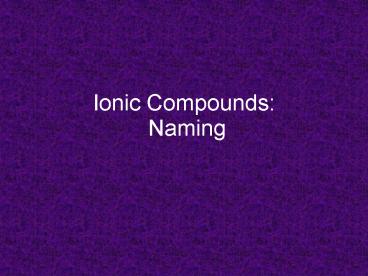Ionic Compounds: Naming - PowerPoint PPT Presentation
1 / 18
Title:
Ionic Compounds: Naming
Description:
Titanium (III) chloride. Manganese (IV) oxide. Cobalt (III) oxide ... Titanium (II) oxide. POLYATOMIC IONS. group of covalently bonded atoms that have a charge ... – PowerPoint PPT presentation
Number of Views:447
Avg rating:3.0/5.0
Title: Ionic Compounds: Naming
1
Ionic Compounds Naming
2
Naming Binary Ionic Compounds
- Always name the metal (the cation/ ion) first
- 2. Write stem of nonmetal (the anion/ - ion)
- 3. Add the ending ide to the nonmetal
3
Stems of nonmetals
4
The First Step in Naming
- Find the metal on the PT
- If the metal has only one oxidation state its
easy - If the metal has more than one oxidation state,
theres an extra step
5
Metals with one oxidation state
- CaO
- BaS
- AlN
- LiCl
- Al2Se3
- Na2O
- K3N
- MgF2
Calcium Oxide
Barium Sulfide
Aluminum Nitride
Lithium Chloride
Aluminum Selenide
Sodium Oxide
Potassium Nitride
Magnesium Fluoride
6
Metals with 1 oxidation state
- Use the formula to figure out which oxidation
state the metal ion has - Ex Fe can be Fe2 or Fe3
- Name FeO and Fe2O3
- two different compounds
- cannot name both iron oxide
- every formula has 1 name only
7
FeO and Fe2O3
- Compounds are electrically neutral
- Oxygen is -2
1 O which is -2
FeO
so Fe must be 2
Name Iron (II) oxide (roman numeral II
charge on Fe)
8
FeO and Fe2O3
- Compounds are electrically neutral
- Oxygen is -2
Each O is -2
Fe2O3
There are 3 Os 3 X (-2) -6 Total negative
charge
Total positive charge must be 6
9
Name the followingHint Positive Always First
Titanium (III) chloride
- TiCl3
- Mn2O4
- Co2O3
- PdBr2
- AuCl3
- MoN
- MnO
- TiO
Manganese (IV) oxide
Cobalt (III) oxide
Palladium (II) bromide
Gold (III) chloride
Molybdenum (III) nitride
Manganese (II) oxide
Titanium (II) oxide
10
POLYATOMIC IONS
- group of covalently bonded atoms that have a
charge - Table E ()ve or ()ve
- polyatomic ions have names
- polyatomic ions can form ionic bonds with
oppositely-charged ions
11
Ternary Compounds
- contain 3 or more elements
- usually contain a polyatomic ion
- if polyatomic is () its bonded to a nonmetal
- if polyatomic is () its bonded to a metal
- sometimes 2 polyatomics are bonded together
12
Formulas with polyatomics
- Whats the formula for the compound formed from
NH41 and Cl-1? - The charges must add up to zero, so just write
the symbols, positive first!
NH4Cl
13
Try a few more
NaOH
- Na and OH-
- K and HCO3-1
- Mg2 and CO3-2
- Li and NO3-
- NH4 and CN-
- Ca2 and SO4-2
KHCO3
MgCO3
LiNO3
NH4CN
CaSO4
14
These are more challenging
Mg3(PO4)2
- Mg2 and (PO4)-3
- (NH4)1 and S-2
- Al3 and (NO3)-1
- Fe2 and OH-1
- Hg22 and SCN-1
- Mg2 and HCO3-
- Al3 and C2O42-
(NH4)2S
Al(NO3)3
Fe(OH)2
Hg2(SCN)2
Mg(HCO3)2
Al2(C2O4)3
15
Some of the most challenging are
Zn(NO3)2
- Zinc Nitrate ion
- Magnesium Hydroxide ion
- Lithium Carbonate ion
- Ammonium ion Bromine
- Potassium Sulfate ion
- Calcium Phosphate ion
- Beryllium Chlorate ion
- Ammonium ion Sulfate ion
Mg(OH)2
Li2CO3
NH4Br
K2SO4
Ca3(PO4)2
(NH4)2SO4
16
Naming compounds with polyatomics
- polyatomic ions have names (Table E)
- naming is parallel to binary naming
- positive always written first
- if ()ve ion is a metal, check to see how many
oxidation states it has - if 1 name must have a roman numeral
- if ()ve is polyatomic - 2nd part of name is
name of polyatomic (dont modify ending)
17
Name the following
Sodium hydroxide
- NaOH
- KHCO3
- LiNO3
- CaSO4
- Al(NO3)3
- Fe(OH)2
- CuSO4
- CuSCN
Potassium hydrogen carbonate
Lithium nitrate
Calcium sulfate
Aluminum nitrate
Iron (II) hydroxide
Copper (II) sulfate
Copper (I) thiocyanate
18
Summary for Binary Ionic Compounds
- Compounds are electrically neutral
- Formula positive first, always
- If metal has more than 1 oxidation state, name
has a roman numeral - Name metal stem of nonmetal ide































